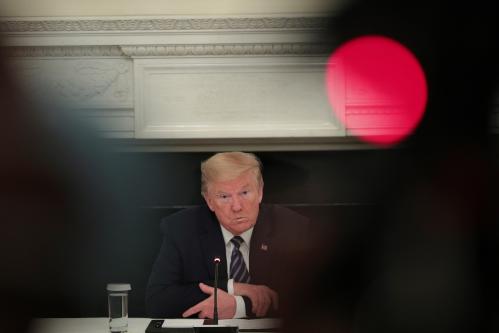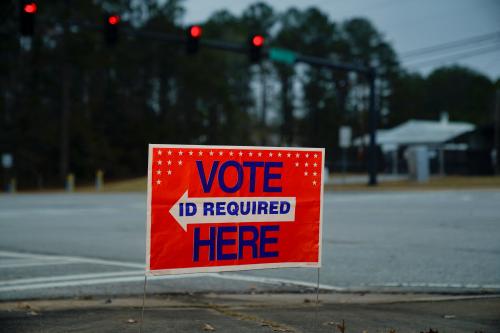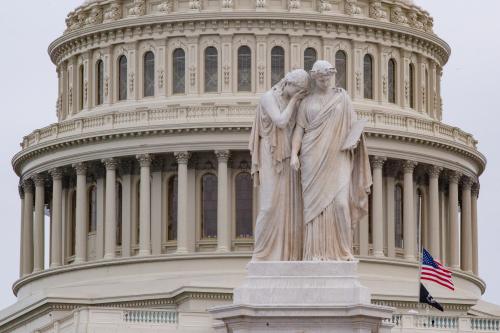Henry Farrell and Elizabeth Saunders explore the parallels of the mob storming the U.S. Capitol with David Cameron’s mistakes that led to Brexit in this piece, which was originally posted in The Washington Post.
Washington generally shrugs at cynical theatrical gestures like the GOP Senate effort, led by Sens. Josh Hawley (Mo.) and Ted Cruz (Tex.), to object to the election results. Politicians see them as useful and harmless. Consider the regular news releases from Sen. Rand Paul (R-Ky.) making National Science Foundation projects sound ridiculous, or the House of Representatives’ decision in 2003 to have its cafeteria call french fries “freedom fries.” Wednesday’s episode in the Senate at first had the appearance of a dinner theater murder mystery in which the key suspects (Democratic operatives; sinister manufacturers of voting machines; the late Hugo Chávez) had been fingered by pro-Trump lawyers.
But this time, the prop revolvers were loaded with live bullets, and half the audience thought the drama was real. Hawley’s decision to challenge the certification of Joe Biden’s presidential victory transformed the process into a farce, in which Cruz and other Republican senators promised to outdo one another’s displays of loyalty to President Trump — until a mob of Trump supporters invaded the Capitol. Their gambit was too jaundiced even for Mitch McConnell (whose biographer dubbed him “The Cynic”); the majority leader exhorted senators to respect the people’s choice and not rely on others to do the right thing.
McConnell was right. The two main protagonists knew they were playacting. Hawley and Cruz graduated from top universities and law schools and clerkships. They know what the Constitution says and how elections work. Even before Wednesday, they understood that their maneuvers wouldn’t actually overturn the 2020 results, so there would be no real consequences. (As a senior Republican said of the president’s election fraud fantasies in November, “What is the downside for humoring him?”) Supposedly, the institutions of American democracy would hold, and they’d get to put on a show to further their presidential ambitions by encouraging a popular delusion on the right.
The problem is that these institutions — even the Constitution — are shaped by what politicians like Hawley and Cruz say and do, and whether people believe them. If everyone thinks the rules work one way, then they do. But if people’s beliefs change, the rules change, too.
Democracy is built upon the notion that politicians who lose elections will admit defeat and move on. By challenging this idea — however insincerely — Hawley and Cruz are helping unravel the core political bargains of American politics. Senators with presidential ambitions cannot treat fundamental beliefs about democracy as something they can put on and take off like a costume, returning to real life when the curtain drops. If they act as though they don’t hold a core democratic belief, they may convince the audience to stop believing, too. Wednesday’s invasion of Capitol Hill shows what happens when people are told that the election has been stolen from them and that there is a chance to take it back.
This wasn’t the first time Republican senators have paid the price for a cynical bargain. Many of them are institutionalists who at first denounced Trump during the 2016 primary race, but endorsed him after he won the nomination and swore he’d grow into the presidency. Asked to justify his fealty, McConnell has pointed to the federal judges and three Supreme Court justices Republicans seated under Trump, as well as tax cuts. But Senate Republicans continued to defend Trump even as he repeatedly sabotaged his own party. There was the pointless 2018-2019 shutdown over Trump’s border wall (the longest shutdown in history) and the president’s recent threat to veto the coronavirus spending bill, which passed with overwhelming bipartisan support, just before the Georgia runoff elections that would decide which party controlled the Senate. There was the Ukraine scandal, which forced the Senate to spend time debating Trump’s use of foreign policy for personal gain, even if the GOP did use its majority to acquit him at his impeachment trial. And there was Trump’s tight embrace of Saudi Arabia after its leader had Jamal Khashoggi killed, a policy that so outraged Republican senators that they rebuked him for it.
It’s not just American politicians whose artificial dramas can have unexpected consequences. Take British Prime Minister David Cameron. He wanted Britain to remain part of the European Union but worried that the electoral threat from the UK Independence Party might rip open a long-standing divide in his Conservative Party over E.U. membership.
Cameron thought he’d found a solution: to promise a referendum that would allow the people to vote on leaving Europe. He figured it was only a pretend promise, and domestic and international institutions would save him from having to deliver. And even if the referendum went ahead, British voters would never choose the costly path of unwinding the country’s deep ties to the E.U. Everyone who really counted knew that would be stupid, even if they sometimes pretended otherwise. Prime Minister Boris Johnson, for instance, began his career making up stories about how the E.U. wanted to do ridiculous things like ban prawn cocktail crisps (a disgusting but popular British delicacy) but also happily described himself as a “fan” of the E.U.
Of course, the other actors in Cameron’s drama didn’t stick to his script. Britons voted for Brexit by a narrow majority, transforming the United Kingdom into a fundamentally different country and threatening the union of its four nations.
Hawley, Cruz and Trump, too, are pursuing short-term political gain at the risk of long-term chaos. Their political theater leaves something — a big something — to chance. They justify their actions as a response to the demands of their constituents. But those actions set precedents and change beliefs about what politicians can and cannot legitimately do when they don’t like election results. What will happen when other politicians decide they can make up the rules as they go along? Already, the Republican majority in Pennsylvania’s Senate removed the lieutenant governor from presiding on Tuesday, because they didn’t want to seat a Democratic senator who had won his election. While they justified this as a response to a “unique set of circumstances,” they too are setting precedents that others will follow.
As commentators have said, Republicans deserve the blame for what is happening to America’s institutions. They may suffer some of the fallout, too. If Republicans stop recognizing results that they don’t like, there is nothing to prevent Democrats from doing the same, tit-for-tat. Seven Republicans in the House of Representatives have warned that efforts to overturn the 2020 vote might erode the advantage that the electoral college gives to their party. GOP candidates need the college, since they have won the popular vote only once in the past 32 years.
Perhaps the authors of Wednesday’s revolt already regret their role in goading the mob. Now that the Democrats have taken the Senate, they are likely to press for federal election reform, a proposition that’s anathema to the right. As political scientist Sam Rosenfeld describes it, some Republicans understand that they benefit more in the long term from “legal anti-democratic institutions” than from dubiously legal “anti-democratic actions,” which are more set-piece theatrical statements than carefully planned strategies.
The challenge for people who want to protect democracy is twofold. First, they need to prevent repeat performances of this most recent theater. Drama is an inevitable part of democratic politics. Politicians will always seek to highlight some problem they care about in ways that grab the public’s attention. Naked ambition of the sort Hawley and Cruz displayed is also an essential part of politics and can be productive when it is yoked to real political needs. It becomes a problem when ambition leads politicians to blur the boundaries between dramatic fiction and essential political facts, undermining the shared beliefs that hold democracy together.
Widespread delusion can have bitter consequences, as we saw Wednesday, when amateur dramatics led a misinformed audience to storm the stage. Cameron’s mistakes meant that the country he led dropped out of Europe and is at greater risk of breaking apart. Cruz and Hawley’s not only helped provoke a mob but could also make American democracy unworkable, as everyone starts challenging every result they don’t like. Politicians can’t rely on political institutions to save the country from the consequences of their playacting, because the institutions aren’t outside the politicians, and the politicians aren’t outside the institutions.
Finally, the republic’s guardians should recognize that the fight to secure democracy isn’t over just because the mob has been evicted from the Capitol. The processes that allow democracy to work (vote counting, redistricting, early voting, identification procedures and voter registration) seem very boring to the public in the years between major elections. But we can go back to enjoying the political performances — and shrugging when the players ham it up — only if everyone knows it’s a play, and the machinery behind the curtain is strong.
The Brookings Institution is committed to quality, independence, and impact.
We are supported by a diverse array of funders. In line with our values and policies, each Brookings publication represents the sole views of its author(s).











Commentary
A cynical ploy like Hawley and Cruz’s looks harmless. Until it isn’t.
January 11, 2021